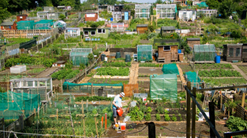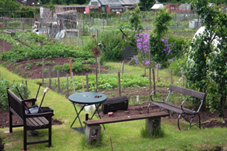|
Urban Gardening:
Urban gardening has come about over the years due to urbanization. As the population grows, rural or natural land is turned into city space (or the “concrete jungle”). This isn’t always good for gardener’s, communities, families, environment or animals, as the natural land is turned to concrete not leaving very much space for any. I mention the animals because many urban gardeners make sure to put up housing for different types of animals that they find beneficial to have around: birds, bugs, worms, bats…. Etc. Since the amount of land that is available is limited and there is usually not enough good growing soil available to plant the vegetables in the ground, city gardeners usually have to be pretty creative, growing in as many locations as they can think of, and that are available.
Communities come together :More and more people find themselves living in condos and apartments with little to no land, finding it very difficult to squeeze in North America's #1 past time. Some people find it relaxing working in the garden. People with some backyard space to spare may find it beneficial for themselves and others to rent out their extra yard for others to grow their vegetables. Here is the website of a local organization, Vancouver BC, that links people that have extra land to rent to people that are looking for it to grow their own fruits and vegetables. It’s win, win, win – as the renters, the rentees, and the environment all benefit (the produce doesn’t have to travel half way around the world to end up on your plate). Take a look at this website from City Farmer in Vancouver that helps gardening enthusiasts find the land that they crave:Backyard sharing from City GardenerA few pictures of Urban Garden spaceSome more pictures of community gardeners sharing a plot of land. As this trend increases it seems that we may even see our communities come together. Take a look at this project, in the city of Vancouver, BC:Video – Vancouver, BC, community Urban garden – Moby – Urban Gardening VideoUrban Growing - Technology and Technique
***A note on Greenhouse Gardening and the cooperative gardening trend. Greenhouses add themselves well to any urban garden project as they extend the growing season and allow people to grow year round. Also, a greenhouse allows the gardener to use as much of the land that is available to them in the most productive way possible. The addition of shelving and benches, added with container gardening grows the overall square footage of garden space that can be used to grow vegetables. Articles :Guerrilla Gardening - Good article that explains how a company came about from this growing trend.
If this interests you, you may also want to take a look at the Backyard Nursery page. The last article proves that everyone is looking for fresh produce that is grown and produced locally. This is also seen with the growth, and popularity of local Farm Markets. Limitations of Urban Gardening/Growing techniques and technologies: As there are many more obstacles involved in growing in an Urban environment compared to conventional gardening, and the topic is pretty new, communities and developing nations are pioneering new techniques all of the time.
As there are many more obstacles involved in growing in an Urban environment compared to conventional gardening, and the topic is pretty new, communities and developing nations are pioneering new techniques all of the time. Gardening projects are starting all over the world, and as people become more aware with some of the techniques, often their love of gardening is re-sparked. The limitations involved are often overcome, and people are tofeed themselves from small plots of land. Farmer’s don’t have to deal with limitations of the concrete jungle. People that Urban garden are very resourceful, always coming up with innovative ways to grow their produce. Be sure to visit the City Farmer website for more information or ideas for your own community on this topic: City Gardener
|




